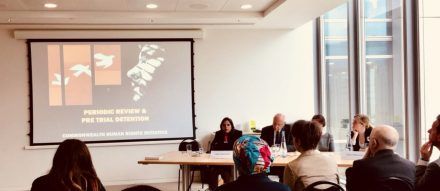Meeting the 2030 Agenda for Sustainable Development: a look at reducing pre-trial detention in efforts to achieve Goal 16

On 12 April 2018, PRI participated in a round table convened on the sidelines of the Commonwealth Heads of Government Meetings (CHOGM) in London, to discuss pre-trial detention in Commonwealth countries. The event was hosted by the Commonwealth Human Rights Initiative (CHRI) in partnership with the Open Society Justice Initiative (OSJI), PRI, Fair Trials, the UN Office on Drugs and Crime and the Institute of Criminal Policy and Research.
Pre-trial detention remains an enormous challenge for prison systems and is one of the main causes of over-incarceration and overcrowding. Around 30 per cent of prison populations globally have not been convicted, and while pre-trial rates have decreased slightly over the past 10 years, in some countries over 60 per cent of people in prison are in pre-trial detention.
These startling statistics formed the context of the round table discussion, which sought to discuss the indicator on the proportion of unsentenced detainees as a proportion of the overall prison population, used to measure progress towards Goal 16 of the Sustainable Development Goals on access to justice.
Reducing pre-trial detention is necessary for sustainable development because, as research by OSJI has shown, there is a direct link between pre-trial detention and low economic development. People who are poor often end up in detention while awaiting their trial for a number of reasons, including unaffordable excessive monetary bail amounts, or in the case of women, they may not own property (as it is not the custom or legally possible).
There were a number of issues with the indicator on pre-trial detention highlighted, including its limitation in collecting data on the duration of pre-trial detention. Furthermore, a reduction in pre-trial detention may have perverse results, for example encouraging pressure to be put on defendants to agree to ‘plea bargaining’ – a problematic and increasingly used practice documented by Fair Trials.
Creative solutions to reducing pre-trial detention need to be found which are suitable for the context and the society they will be applied to. This is clear from a 2015 study by PRI and pro-bono lawyers on how bail works as an alternative to pre-trial detention. Forty-five legal jurisdictions were studied, and the findings were conclusive: while bail is often available in law, in practice there are many practical problems that inhibit its use.
There is consensus that pre-trial detention cannot be viewed in isolation of the wider criminal justice system. For instance, in Kenya, PRI has found that decriminalising minor offences – a recommendation from the 10-point plan on reducing pre-trial detention – allows for detention at both the pre-trial and post-sentence stage to be avoided. This is because the ‘automatic’ placement of suspects in pre-trial detention is common, regardless how minor the offence may be.
The commitments made in the 2030 Agenda for Sustainable Development by UN member states are ambitious. Criminal justice reform – in a wide sense – is needed if the goals are to be achieved.
More information
- See PRI’s 10-point plan on reducing pre-trial detention and PRI’s 10-point plan on overcrowding
- See the Special Focus of Global Prison Trends 2017 by PRI and the Thailand Institute of Justice: ‘The Sustainable Development Goals and Criminal Justice’
Photo: Omar Phoenix Khan